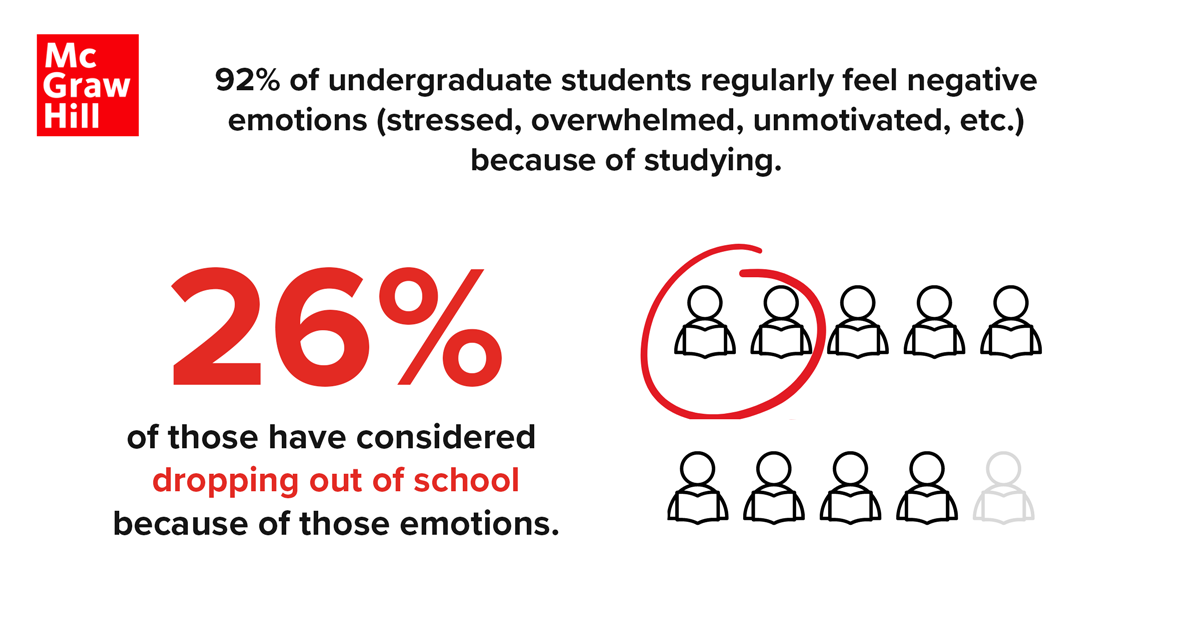My Account Details
College can be stressful – but there are ways to manage it
In a recent survey, we found that one in four learners considered dropping out of school because of study difficulties.

Buma Tete's days are carefully orchestrated, with all upcoming assignments plotted out on a master calendar and broken up into daily to-do lists. It's this level of organization that allows Buma, a senior accounting major at the University of Maryland at College Park, to successfully balance a full academic schedule, an internship and a role as a student ambassador at McGraw Hill.
So far, his system has had only one major hiccup, during the fall of 2021, when he and his classmates returned to campus. Excited to be with his friends again, Buma focused less on timelines and test banks and more on hanging out. To stay on track academically, he resorted to cramming sessions and all-nighters, which left him feeling stressed. At times, he says, the sheer amount of work in front of him was "overwhelming."
Feeling anxious about schoolwork is nothing new for learners. However, the number of college students reporting mental health struggles has spiked in recent years. A recent survey conducted by Morning Consult on behalf of McGraw Hill has shed more light on the extent of study stress and its impact on learners. (The survey was part of our research for the development of SHARPEN, a new mobile app launched last fall that delivers content in social media-friendly formats.)
According to the survey's findings, students broadly face challenges when it comes to studying. A lack of time and a lack of engagement with schoolwork were among the top obstacles.
In fact, 92% of undergraduate students we surveyed said they regularly feel negative emotions because of studying. "Stressed," "overwhelmed," "unmotivated," "distracted" and "boredom" were among their most-cited feelings. What's more, one in four learners (26%) considered dropping out of school because of study difficulties they faced the previous semester.

"Students currently enrolled in higher education endure myriad stressors as they balance academics with other areas of their lives," explains Dr. Katie Hurley, DSW, LCSW, The Jed Foundation (JED) clinical consulting expert.
But the good news, she adds, is that there are ways students can learn to manage their academic stress. "Creating study groups for their classes, utilizing tutoring options available on campus, and engaging in self-care strategies, including daily exercise, sleep hygiene, proper nutrition, and mindfulness practice can all help students learn to work through their stress," Dr. Hurley says. "Connection with other students and supportive educators and prioritizing mental health care are of the utmost importance for college students today." (There are also free mental health resources for students on JED's website.)
Those sorts of strategies helped Buma find his balance after that fall semester. He replaced his trusty online calendar with a task management app that lets him create more detailed timelines and to-do lists. He also routinely reviews upcoming coursework. If there's a topic he thinks he might struggle with, he tries to read up on it ahead of time and jot down questions to ask during class. "Then I organize my schedule to give myself a little bit of free time to go back and review things I don't understand," he says.
Just as important, when he's feeling overwhelmed or stressed, he hits the pause button. "Find a way to calm yourself down, to find your happy place, so you can recollect yourself before tackling another task," he advises. For Buma, that involves laying down, putting on headphones and listening to music. "I just stare at the ceiling. I'm not watching anything," he says. "When I close my eyes, I just sit there for like 10 or 15 minutes. And when I wake up, I'm like, I'm ready to go."